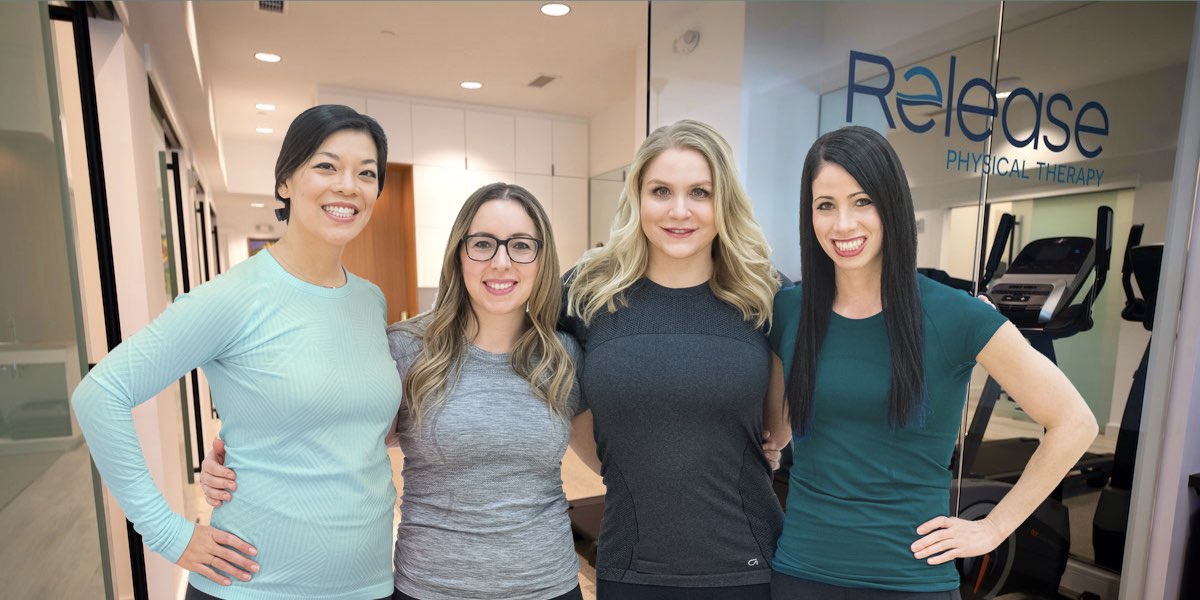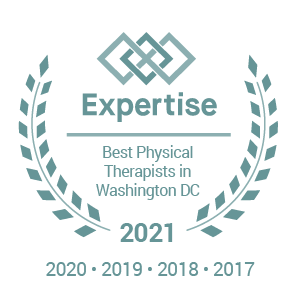
Postpartum Physical Therapy in Washington, D.C. and Tysons, VA
At Release Physical Therapy, our experienced therapists perform comprehensive assessments to see where you might need help after having given birth. We then design individualized treatment plans aimed at promoting healing and relieving your specific issues.
Postpartum Physical Therapy in Washington, D.C. and Tysons, VA
At Release Physical Therapy in Washington, D.C. and Tysons Corner, VA, our experienced postpartum therapists perform comprehensive assessments to see where you might need help after having given birth. We then design individualized treatment plans aimed at promoting healing and relieving your specific issues.
Book an appointment online with your preferred therapist at one of our convenient locations.
Release PTs have advanced training and experience in several techniques - including listening.
We use evidence-based therapies to target the root cause of a condition, not just the symptoms.
We'll help you get back to work, back in the game, and back to doing the activities you love.
Physical Therapy for Post-Pregnancy in Washington D.C. & Tysons Corner, VA
What is postpartum physical therapy?
Postpartum physical therapy is a specialized form of rehabilitation that addresses the unique physical challenges women may face after childbirth. Known as the postpartum period, it can bring various physical changes and conditions that can benefit from targeted physical therapy. Here are some essential elements of postpartum physical therapy:
Pelvic Floor Physical Therapy Postpartum Rehabilitation: Childbirth can weaken the pelvic floor muscles, leading to conditions like incontinence, pelvic pain, and pelvic organ prolapse. Therapy includes exercises and techniques to strengthen these muscles.
Diastasis Recti Treatment: This condition involves the separation of the abdominal muscles, which can occur during pregnancy. Physical therapy helps in restoring the strength and function of these muscles.
Pain Management: Postpartum physical therapy can address back pain, pelvic pain, and other musculoskeletal pains through exercises, posture education, and manual therapy.
C-Section Recovery: For those who had a C-section, postpartum physical therapy helps with scar tissue mobilization and strengthening the core muscles to aid recovery.
Postural Training: Adjusting to life with a new baby includes breastfeeding and carrying the child, which can strain the neck, back, and shoulders. Therapy can provide strategies to improve posture while reducing discomfort.
Functional Training: Therapists focus on exercises that improve the ability to perform daily activities efficiently and safely, like lifting and carrying your baby.
Education and Prevention: Postpartum physical therapy educates mothers on body mechanics and self-care techniques to prevent future injuries.
Emotional and Psychological Support: While the primary focus is on physical rehabilitation, our Release PT therapists are compassionate and they acknowledge and support the emotional and psychological aspects of postpartum recovery.
Postpartum physical therapy isn’t limited to just the period following childbirth. Women can experience postpartum issues months or even years later, and physical therapy can be beneficial at any point during this time. Engaging in postpartum physical therapy can significantly aid in a mother’s recovery and improve her quality of life after childbirth.
What does a postpartum physical therapy session typically involve?
Postpartum physical therapy sessions typically include the following components:
- Initial Evaluation: Assessing medical history, pregnancy and delivery details, and current symptoms.
- Physical Assessment: Checking posture, pelvic floor strength, abdominal muscle separation, and overall physical condition.
- Goal Setting: Establishing personalized recovery and strengthening objectives.
- Customized Exercise Plan: Tailoring exercises for pelvic floor strengthening, core stabilization, and overall conditioning.
- Education: Providing information on body mechanics, postural strategies for baby care activities, and pain management.
- Hands-On Therapy: Applying manual therapy techniques like massage or scar tissue mobilization, if necessary.
- Home Exercise Program: Assigning exercises to perform at home to support recovery.
- Progress Monitoring: Adjusting the therapy plan based on recovery progress in follow-up sessions.
- Closure and Follow-Up Plan: Review progress, maintain improvements, and discuss any ongoing care needs.
This approach ensures a comprehensive, personalized rehabilitation tailored to the specific needs of the mother’s postpartum period.
Conditions Treated by Postpartum Physical Therapy
Postpartum physical therapy effectively treats a variety of conditions that women may experience after childbirth. Common conditions treated include:
- Diastasis Recti: Strengthening exercises to close the gap in separated abdominal muscles.
- Pelvic Floor Dysfunction: Therapy to strengthen weakened pelvic muscles, addressing incontinence, pain, and prolapse.
- Urinary and Fecal Incontinence: Exercises to regain control of pelvic muscles and manage incontinence.
- Pelvic Girdle Pain: Alleviating pain in the lower back, hips, and pelvic area.
- Pelvic Organ Prolapse: Management and prevention techniques for descended pelvic organs.
- Back Pain: Postpartum back pain can be helped by physical therapy exercises and manual therapy.
- C-Section Recovery: Assisting in healing, managing scar tissue, and restoring core strength.
- Sexual Dysfunction: Pelvic floor rehabilitation to address pain during intercourse.
- Core Weakness: Core-strengthening exercises to enhance recovery and stability.
- Postural Changes: Correcting posture affected by new baby care activities.
This holistic approach enhances overall well-being and the ability to care for a new baby, as well as aiding in recovery.
Benefits of Post-Pregnancy Physical Therapy
The benefits of post-pregnancy physical therapy for new mothers are many and include:
- Faster Recovery: Speeds up the return of strength and function post-childbirth.
- Pelvic Floor Strengthening: Enhances pelvic muscle strength, reducing incontinence and prolapse risks.
- Pain Reduction: Addresses common pains like back and pelvic discomfort.
- Improved Core Strength: Rebuilds core stability, assisting in diastasis recti recovery.
- Better Posture: Improves body mechanics and posture, easing strain during childcare.
- Enhanced Mobility: Restores mobility and physical activity to pre-pregnancy levels.
- Emotional Well-being: Positively influences mental health during the postpartum period.
- Customized Care: Tailors therapy to individual needs and recovery goals.
- Education and Prevention: Offers guidance on body mechanics and injury prevention.
- C-Section Recovery Support: Provides specialized care for cesarean section healing.
Engaging in post-pregnancy physical therapy empowers new mothers with the physical and emotional strength needed to care for themselves and their newborns.
How long after birth should I wait to see a physical therapist?
It’s generally recommended to see a physical therapist for a postpartum check-up about 6-8 weeks after childbirth. If you’re experiencing significant discomfort, seek therapy earlier. Always consult with your healthcare provider for personalized advice about your health and recovery.
Now Accepting New Patients
Feel Your Very Best
Whether you’re an athlete that plays hard on the field, or a weekend warrior that plays hard in life, committing to a physical therapy program can help to keep you moving forward.
How long should postpartum physical therapy last?
The duration of postpartum physical therapy varies based on individual needs and progress:
- Recovery Goals: Specific fitness and recovery goals can influence the amount of therapy sessions that are needed.
- Condition Severity: More complex or severe issues may require a longer period of therapy over time.
- Response to Therapy: The effectiveness and speed of response to treatment can impact how many sessions may be needed.
- Patient Commitment: Adherence to prescribed exercises and recommendations affects recovery time.
- Healthcare Advice: Ongoing assessments by our Release PT therapists will guide the therapy timeline.
Typically, therapy might last from a few weeks to several months, with some women seeing improvements in 6 to 8 weeks. Regular evaluations with our Release PT therapists are important to adjust treatment plans to ensure comprehensive recovery.
Best Physical Therapy Exercises for Post-Pregnancy
For post-pregnancy recovery, our Release PT postpartum physical therapy exercises include pelvic floor strengthening (like Kegels), abdominal bracing for core stability, gentle yoga or Pilates for flexibility, low-impact cardiovascular activities like walking or swimming, and targeted stretches for relieving back and pelvic pain. Always consult a therapist for personalized guidance.
When should you not do postnatal physical therapy?
Postpartum physical therapy may be inadvisable after high-risk or complicated deliveries, medical complications like severe hypertension, recent surgeries, severe or acute pain, active infections, unhealed wounds, or extreme fatigue. Always consult a healthcare provider for clearance and guidance before starting therapy post-childbirth.
Does insurance cover postpartum physical therapy?
Insurance coverage for postpartum physical therapy can vary depending on the insurance plan, the reason for therapy, the region you are in, and potential out-of-pocket costs like deductibles and copays. Directly consult with our insurance provider to understand the specific details of your coverage. Call our office at Release PT to inquire about insurance coverage for postpartum physical therapy.
We'll help you get back to work, back in the game, and back to doing the activities you love.
Release Physical Therapy
Treatments
At Release Physical Therapy Washington, DC, we offer a full range of manual therapies, as well as both traditional and non-traditional techniques. We work one-on-one with our patients to develop an individualized treatment plan that meets their unique needs, conditions, wellness goals and fitness levels. Learn More
ASTYM ® Therapy
Regenerates healthy soft tissues (muscles, tendons, etc.), and eliminates or reduces unwanted scar tissue that may be causing pain or movement restrictions.
Functional Training
Exercise regimens that integrate multiple muscle groups, joints and the brain to prepare the body for everyday movement, athletics and other specialized physical activities.
Shockwave Therapy
A non-invasive, office based treatment that utilizes acoustic waves to alleviate pain, promote tissue regeneration, and accelerate the healing process.
Meet Washington DC's best
Physical Therapists
Our experienced and highly trained physical therapists specialize in treating the outpatient orthopedic population, including sports therapy, orthopedic/spinal therapy, chronic pain management, pre/post-surgical therapy, as well as wellness and prevention. All of our physical therapist are accepting new patients.
Meet Washington DC's Best
Physical Therapists
Monday - Thursday
6:00 am - 8:00 pm
Mon - Thur
6:00 am - 8:00 pm
Friday
6:00 am - 5:00 pm
Saturday
By appointment
Sunday
Office is closed
What Patients Are Saying
What Patients Say
"Dr. Simon's knowledge, expertise and patience have given me my life back. She spent more time discussing my injuries and recovery than both my doctor and an orthopedist." - L.J.
Health & Safety
Covid-19
At Release Physical Therapy, there is nothing more important to us than the health and safety of our patients and staff during this unprecedented time. The Department of Homeland Security and state governments have deemed physical therapy an essential component of healthcare during the coronavirus (COVID-19) pandemic; therefore, our office will remain open to serve those in need. We are taking extensive preventative measures to protect our patients and employees who enter our clinic. Learn more
Latest Blog Posts
The Right Way to Breathe: Understanding the Diaphragm and Pelvic Floor
A condition called FAI (femoral acetabular impingement syndrome) could be the cause of your hip pain. Learn the symptoms and how physical therapy may be able to help.
Understanding Urinary Incontinence: It’s Time to Break the Silence
A condition called FAI (femoral acetabular impingement syndrome) could be the cause of your hip pain. Learn the symptoms and how physical therapy may be able to help.
Can You Exercise During Pregnancy? The Answer Is, Absolutely.
Despite its name, tennis elbow is isn't just for tennis players. It’s a common ailment that can affect anyone who frequently uses their arm, forearm, and hand.
Follow us on Instagram!
Error: No feed found.
Please go to the Instagram Feed settings page to create a feed.
Location & Hours
Hours of Operation
Monday-Thursday: 6am - 8pm
Friday: 6am - 5pm
Saturday: By appointment
Sunday: Office closed
Office Address
Release Physical Therapy
2134 L St NW, Washington, DC 20037
Our Physical Therapists
Our experienced and highly trained physical therapists specialize in treating the outpatient orthopedic population, including sports therapy, orthopedic/spinal therapy, chronic pain management, pre/post-surgical therapy, as well as wellness and prevention. All of our physical therapists are accepting new patients.























